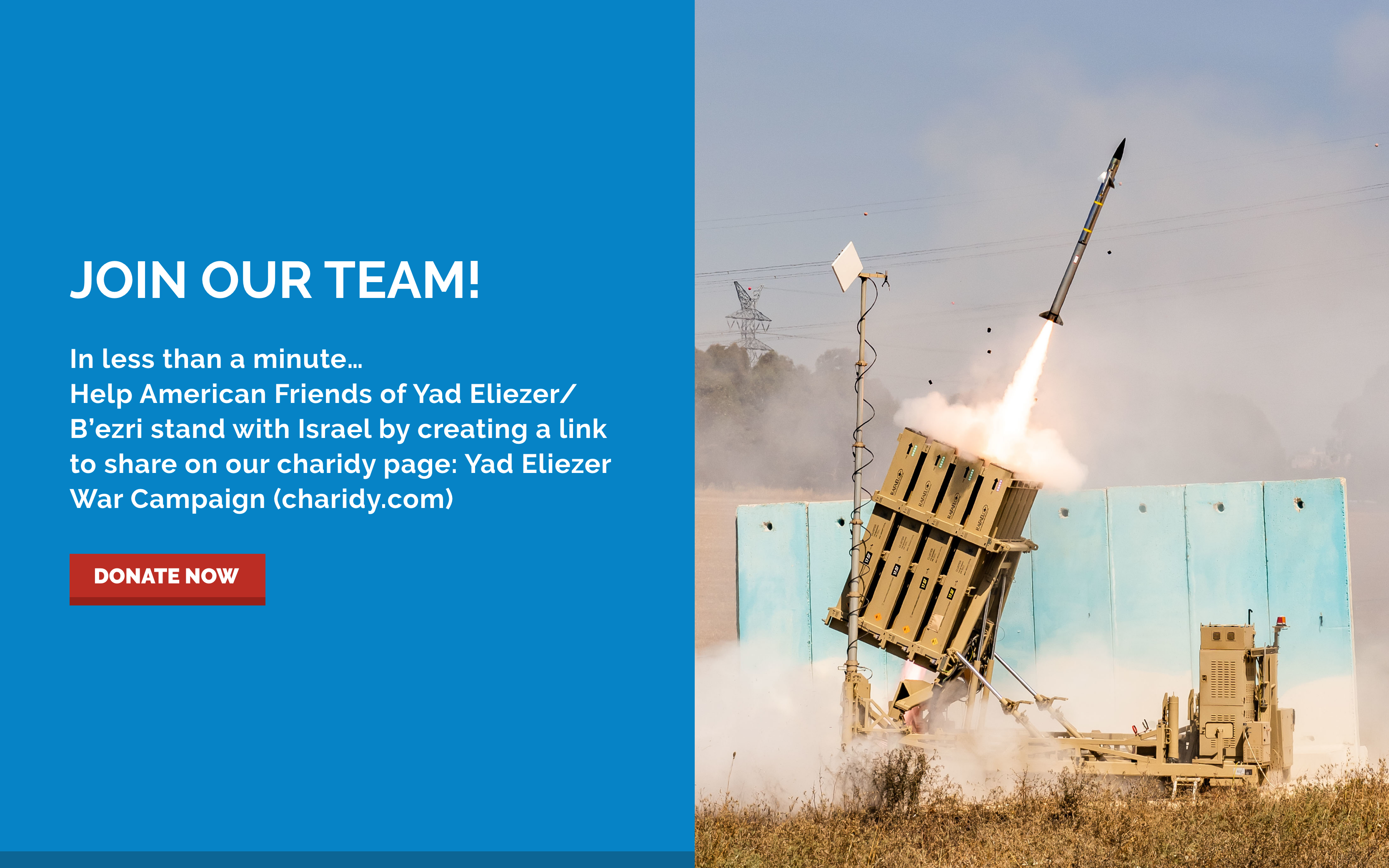American Friends of Yad Eliezer now partners with B'ezri

Voices of the Needy
by Karen Reiffman
0 Comments | Monday, July 29, 2019 under Feed-a-Baby, Surplus Produce, Shabbat Chicken, Big Brothers and Big Sisters Program, Widow and Orphan Fund, Job Training, Emergency Fund, Adopt-a-Wedding , Kol Kallah Bridal Fund, Bar Mitzvah Project, Holiday Fund, Meals-on-Wheels, Medical SupportYad Eliezer is a Voice for the Voiceless
"Our refrigerator is empty-literally empty-there is no bread, no cheese or eggs, no milk-mamash nothing.""I've been an aguna for 19 years, raising six children alone and fighting every day to get by...my electricity is going to be cut off today because I haven't been able to pay for it..."
"I haven't been able to work for nine months because of my surgery so there is no income- my landlord is evicting us and I don't even have money for a mover."
"Our kids are sleeping on the floor, we can't afford to buy them beds...I am breaking down..."
They are difficult to read, but these are the words - the voices - of the needy. They're segments from some of our tfasei bakasha (applications), written by people who have approached Yad Eliezer for help. The needs range from the most basic necessities like milk and bread with which to feed a family (see above), to funds for higher education, with the urgent hope that it will enable a struggling man or woman to pull themselves out of poverty, and everything in between. The requests come in the form of these written applications but they also come in as phone calls. Often they're expressed in a face to face conversation that involves despair, embarrassment and tears. It's heartbreaking, and it's never ending.
Until you read one of these forms, are on the listening end of the phone call, or have that face to face conversation, it's hard to imagine what it's like for someone who is suffering - a parent, a child, a bride, a grandparent, an aguna - to appreciate what they are really going through. We often hear the words "poor" or "needy" but what do they really mean? It’s hard to understand the extent to which poverty reaches-until someone opens a door into their lives and invites you in. It’s only then that you get a clearer glimpse into their day to day challenges and an insight into how complex those challenges are.
Working at Yad Eliezer, I learn every day how powerful a force poverty is. How it can develop over time (for example- years of low income jobs or no job at all) or unexpectedly (due to a sudden illness or a chronic, ongoing one). How it robs a person of their most basic needs (food, electricity, new shoes), and also how it affects their physical surroundings (homes with broken windows and crumbling walls) and emotional health (stress, conflict, depression). How it strikes in different ways, in different seasons (no money for air conditioning in the summer, unheated apartments in the winter). How hard it is to climb out of it, especially when it passes from one generation to the next (a child from an impoverished home very likely grows up without the opportunity for higher education and improved incomes).
My coworkers and I become privy to people's most personal information, and often we end up not only doing our regular jobs but also serving as impromptu "therapists" for people who not only need help financially but also have a need to talk to someone who will listen. It’s not easy but we know that it’s another way in which we can help.
The staff of Yad Eliezer is aware of these ins and outs of poverty and we also know how our programs reach out to help in as many ways as possible. And when we do, we experience the other end of the chesed process. The expressions of gratitude from the people we assist are equally as varied, equally as personal. And the same people who need to ‘talk it out’ with us before receiving help also need to express their appreciation to Yad Eliezer afterwards-in letters, over the phone, and in person-tears included.
“I simply have no words to describe the relief you provided for my family!”
“We can only thank G-d for creating people who are as caring and as giving as you”
“You helped me with dignity, with respect”
“May your donors always, always be blessed”
“I truly hope that one day I can help other people as you’ve helped me”
Thanks to the generosity of our donors, these, too, are the words - the voices - of the needy.
More Stories
AFYE/B’ezri: $900k Distributed for Purim, Pesach on the Way
Monday, March 24, 2025 Holidays for IDF Soldiers, Help the needy on Passover, Help the needy of Israel on PassoverThe Chesed Machine Never Stops
+READ MOREPictures Worth a Thousand…Thanks
Wednesday, February 26, 2025 Matanot L'Evyonim, Food Support,Food support so impactful it warrants a photo
+READ MORETwo Sides of the Same Tzedaka Coin
Thursday, February 06, 2025 Emergency Fund, Winter Warmth Campaign,Siblings share a love of helping needy families through B'ezri
+READ MOREWhen a Legacy Illuminates Generations
Wednesday, January 15, 2025 Feed-a-Baby,A six year old is inspired to help Feed A Baby
+READ MORESupport, Encouragement and Gratitude
Wednesday, January 01, 2025 Widow and Orphan Fund, Chanukah help, Stand With IsraelExpressions of thanks for our Chanukah help are pouring in
+READ MOREFive Ways to Make it a Better Winter
Monday, December 09, 2024 Feed-a-Baby, Emergency Fund, Bar Mitzvah ProjectTogether we can warm families' lives
+READ MORE








leave a comment